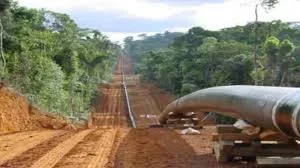 The East African Crude Oil Pipeline (EACOP) project has taken a significant step forward as construction progresses, marking a pivotal moment in Uganda’s oil exploration and export plans. The pipeline, which will transport crude oil from Uganda’s oil fields in the Albertine region to the port of Tanga in Tanzania, is expected to be one of the longest heated pipelines in the world, spanning approximately 1,443 kilometers.
The East African Crude Oil Pipeline (EACOP) project has taken a significant step forward as construction progresses, marking a pivotal moment in Uganda’s oil exploration and export plans. The pipeline, which will transport crude oil from Uganda’s oil fields in the Albertine region to the port of Tanga in Tanzania, is expected to be one of the longest heated pipelines in the world, spanning approximately 1,443 kilometers.
The EACOP project is a joint venture between the Uganda National Oil Company, TotalEnergies, and the China National Offshore Oil Corporation (CNOOC). As of today, TotalEnergies confirmed that over 60% of the land acquisition process has been completed, with the majority of the affected communities having received compensation. This progress comes amid scrutiny and concerns regarding environmental impacts and human rights issues linked to the pipeline’s construction.
The Ugandan government, under President Yoweri Museveni, has emphasized the importance of the EACOP project in boosting the country’s economy and attracting foreign investment. In recent remarks, President Museveni stated that the project would not only create jobs but also facilitate energy security and development in Uganda and the broader East African region.
The construction of the pipeline involves various stages, including clearing of land, building access roads, and laying the pipeline itself. In response to environmental concerns, the project has implemented measures aimed at minimizing ecological damage, such as using technology to monitor and prevent spills.
Despite these assurances, environmental activists and organizations such as Greenpeace have raised alarms about the potential threats to wildlife and ecosystems along the pipeline route, particularly in protected areas. They argue that the project could exacerbate climate change and undermine local communities’ livelihoods.
The EACOP is expected to have a capacity of 216,000 barrels of oil per day, significantly enhancing Uganda’s export capabilities. Once operational, it is projected to generate substantial revenue for the Ugandan government, with estimates suggesting that it could yield over $2 billion annually.
As construction continues, stakeholders remain vigilant about the project’s implications for environmental sustainability and community welfare. The Ugandan government and project partners are expected to hold consultations with local communities to address concerns and ensure transparency throughout the pipeline’s development.
The EACOP project is a critical component of Uganda’s oil strategy, and its advancement is seen as a vital step towards unlocking the country’s hydrocarbon potential.
Meta Title:
Meta Description:






















